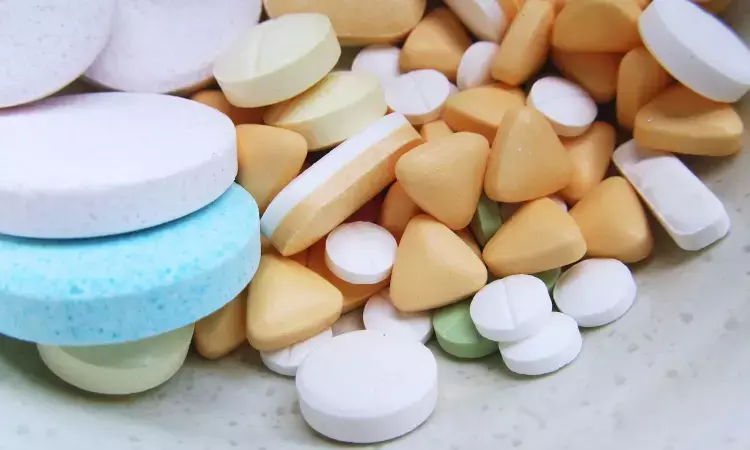- Home
- Medical news & Guidelines
- Anesthesiology
- Cardiology and CTVS
- Critical Care
- Dentistry
- Dermatology
- Diabetes and Endocrinology
- ENT
- Gastroenterology
- Medicine
- Nephrology
- Neurology
- Obstretics-Gynaecology
- Oncology
- Ophthalmology
- Orthopaedics
- Pediatrics-Neonatology
- Psychiatry
- Pulmonology
- Radiology
- Surgery
- Urology
- Laboratory Medicine
- Diet
- Nursing
- Paramedical
- Physiotherapy
- Health news
- Fact Check
- Bone Health Fact Check
- Brain Health Fact Check
- Cancer Related Fact Check
- Child Care Fact Check
- Dental and oral health fact check
- Diabetes and metabolic health fact check
- Diet and Nutrition Fact Check
- Eye and ENT Care Fact Check
- Fitness fact check
- Gut health fact check
- Heart health fact check
- Kidney health fact check
- Medical education fact check
- Men's health fact check
- Respiratory fact check
- Skin and hair care fact check
- Vaccine and Immunization fact check
- Women's health fact check
- AYUSH
- State News
- Andaman and Nicobar Islands
- Andhra Pradesh
- Arunachal Pradesh
- Assam
- Bihar
- Chandigarh
- Chattisgarh
- Dadra and Nagar Haveli
- Daman and Diu
- Delhi
- Goa
- Gujarat
- Haryana
- Himachal Pradesh
- Jammu & Kashmir
- Jharkhand
- Karnataka
- Kerala
- Ladakh
- Lakshadweep
- Madhya Pradesh
- Maharashtra
- Manipur
- Meghalaya
- Mizoram
- Nagaland
- Odisha
- Puducherry
- Punjab
- Rajasthan
- Sikkim
- Tamil Nadu
- Telangana
- Tripura
- Uttar Pradesh
- Uttrakhand
- West Bengal
- Medical Education
- Industry
Indian Pharma Market Grows at 9.9%, Vaccine Sales See Sharp Decline: Pharmatrac Report

New Delhi: The Indian Pharmaceutical Market (IPM) posted a solid 9.9% increase in value, reaching Rs 19,388 crore in November 2024. This growth was accompanied by a modest 3.1% rise in unit sales, according to data from AIOCD-AWACS. While the results indicate positive momentum, the market faces several challenges that temper the overall outlook.
According to a Pharmatrac report, strategic pricing was a key driver of growth, with many therapies recording price hikes. Chronic therapy segments, particularly cardiac and anti-diabetic drugs, saw steady growth due to the increasing focus on lifestyle diseases. Acute therapies like anti-infectives and dermatological treatments also contributed, though their impact was more subdued compared to chronic therapies.
However, the market's volume growth remains uneven. While certain categories, such as gastrointestinal and urology therapies, demonstrated recovery with promising volume increases, other segments faced setbacks. The vaccines category, for example, experienced a sharp -37.8% decline in unit growth, and a -13.6% decline in value growth, reflecting challenges in this segment.
Therapy-wise data revealed varied contributions to the monthly growth. Cardiac therapies maintained a strong lead with 13.2% of the market share, growing by 11.7% in value and 1.8% in units. Gastrointestinal therapies followed closely, contributing 11.4% to the market with 11.0% value growth and a higher unit growth of 6.8%.
Anti-infectives and anti-diabetic therapies also saw solid performances. Anti-infectives accounted for 12.2% of the market, with an 8.4% value growth, although unit growth was relatively flat at 0.3%. Anti-diabetic drugs, representing 9.1% of the market, posted a value growth of 10.1% and unit growth of 4.8%, reflecting the rising prevalence of chronic conditions such as diabetes.
Also Read: Indian Pharma Market Posts Robust 10.7% Growth in November, Foracort Tops Sales: IQVIA
On the other hand, vitamins, minerals, and nutrients saw a more modest 7.4% value growth, with a slight decline in unit growth (-0.8%). Despite this, dermatological therapies showed a significant surge with a 15.8% increase in value and 8.3% growth in units. Urology and ophthalmology therapies also demonstrated strong results, with value growth of 15.8% and 10.7%, respectively, and positive unit growth in both categories.
While the overall market performance was positive, certain challenges persist. Notably, the vaccines segment struggled, with a sharp 37.8% drop in unit sales.
Leading corporates continued to assert their market leadership. Sun Pharma, with a 14.9% monthly growth, maintained its top position. Abbott followed with an 11.4% growth, while Alkem Laboratories posted a standout 15.9% value growth. Smaller players like La Renon and Nutricia also showed strong results, benefiting from innovative products and strategic expansion.
Top brands were pivotal in driving monthly growth, with Augmentin by GSK maintaining its lead, growing by 6.5%. Abbott’s Mixtard performed exceptionally well, with a 16.0% growth, and Pan by Alkem exceeded expectations with a 17.5% value increase.
Despite these positive results, the IPM must navigate challenges such as fluctuating demand in specific therapies and the need for sustained innovation to remain competitive. The overall market growth in November 2024 reflects a mixed landscape, with solid gains in some areas and setbacks in others.
Farhat Nasim joined Medical Dialogue an Editor for the Business Section in 2017. She Covers all the updates in the Pharmaceutical field, Policy, Insurance, Business Healthcare, Medical News, Health News, Pharma News, Healthcare and Investment. She is a graduate of St.Xavier’s College Ranchi. She can be contacted at editorial@medicaldialogues.in Contact no. 011-43720751


